Watch "Black Panther: Wakanda Forever" Stars Letitia Wright And Winston Duke Speak To An Exclusive D23 Panel About Diversity
D23 Expo 2022 came and went! I was on the ground live at the event, and it was super dope.
#D23Expo #ThorLoveAndThunder #GoatYoga
A very close friend of mine, Lee Wren, someone I consider a brother, passed away after a battle with cancer earlier this year. He and I are MCU fans on the HIGHEST level, so I brought his ashes with me to the event. Lee and I hung out and really took everything in.
Me and @LeeWren at #D23Expo
Although the MCU panel, led by Marvel head Kevin Feige, was amazing (I'm sooo hype for Thunderbolts, and that Black Panther: Wakanda Forever exclusive footage made me cry), I later attended an even more intimate panel that stuck with me.
#BlackPantherWakandaForever cast here at #D23Expo2022. Here's #LetitiaWright speaking about the upcoming sequel.
The panel was entitled ABC’s On the Red Carpet Storytellers Spotlight, and featured three separate panels of creators and artists from Disney discussing diversity, inclusion, and belonging in the industry.

The second of these panels featured two of the biggest stars from Black Panther: Wakanda Forever: Letitia Wright (who plays Shuri) and Winston Duke (who plays M'Baku). Nate Moore, who produced both Black Panther films, also joined the panel.
#LetitiaWright #WinstonDuke and #NateMoore hop on stage to speak about diversity in the #MCU at #D23Expo
Nzinga opened up the panel on diversity by asking Wright, Duke, and Moore, "What was the first moment where you knew you wanted to become a storyteller?"
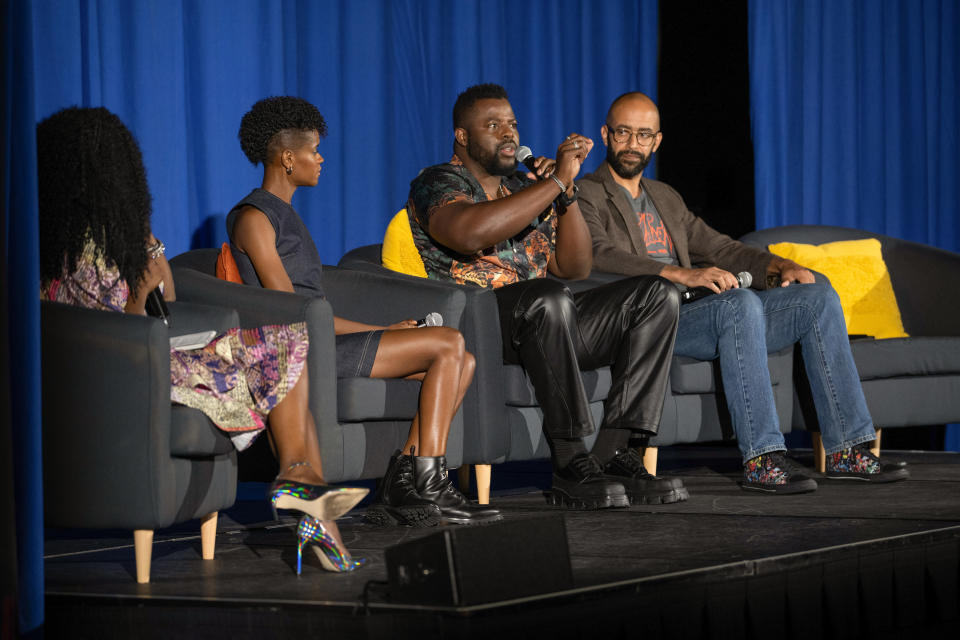
Duke was the first to answer. "I always say that, you know, life was preparing me to be a storyteller even before I knew. So I'm from the Caribbean from Trinidad and Tobago."
#WinstonDuke speaks about his Caribbean heritage and storytelling at #D23Expo
Wright answered next. "I can relate; as a child, I grew up watching American TV as well: Family Matters, Fresh Prince of Bel Air. And so, the way they express themselves and the way they connected to me when I was a child, there was a spot there."
Here's #LetitiaWright speaking on cultural influences and diversity at #D23Expo #BlackPantherWakandaForever
"So I'm 12, and he brings a script that he wrote about the story of Rosa Parks, and I remember reading it, and my teacher encouraged me to audition to play Rosa Parks," Wright stated. "I do not know this woman and her struggles and her sacrifices, but the impact she left on my life just made me feel like I could move mountains just by standing up to a bunch of kids you know, making a bus out of some seats on the stage, and be like, 'Nah I ain't moving to the back; I'm moving to the front.' That moment for me, I was like, if I could convey this feeling, if I can produce this feeling that I feel in others through stories that matter, stories that are impactful, then I've made a difference in the world, and that's why we have Wakanda Forever."
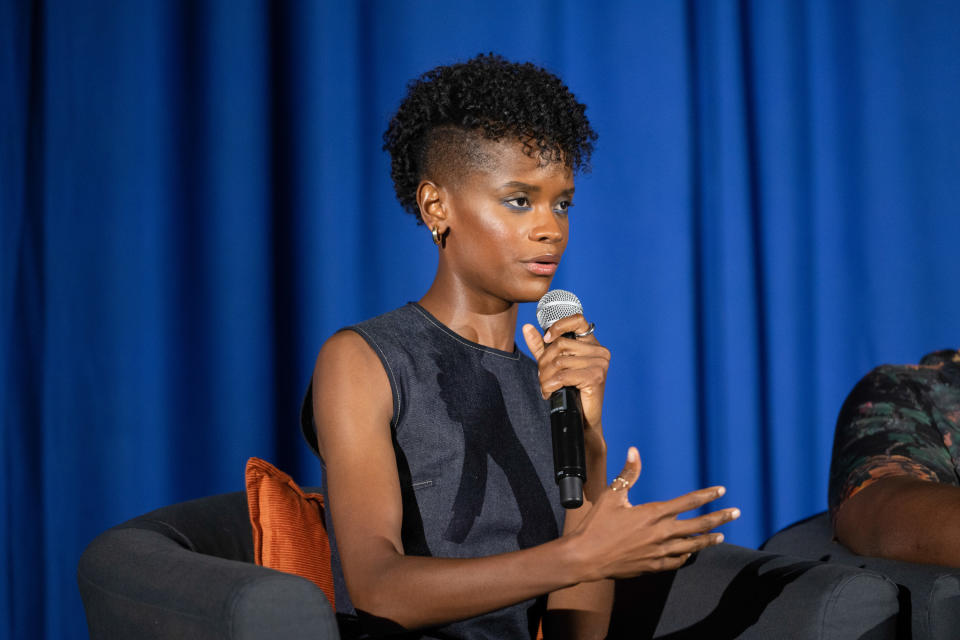
Lastly, Moore gave his answer. "Yeah, mine was actually earlier than both these guys; I'm older. So I remember the first time I went to a movie was in 1982, the youngest of four."
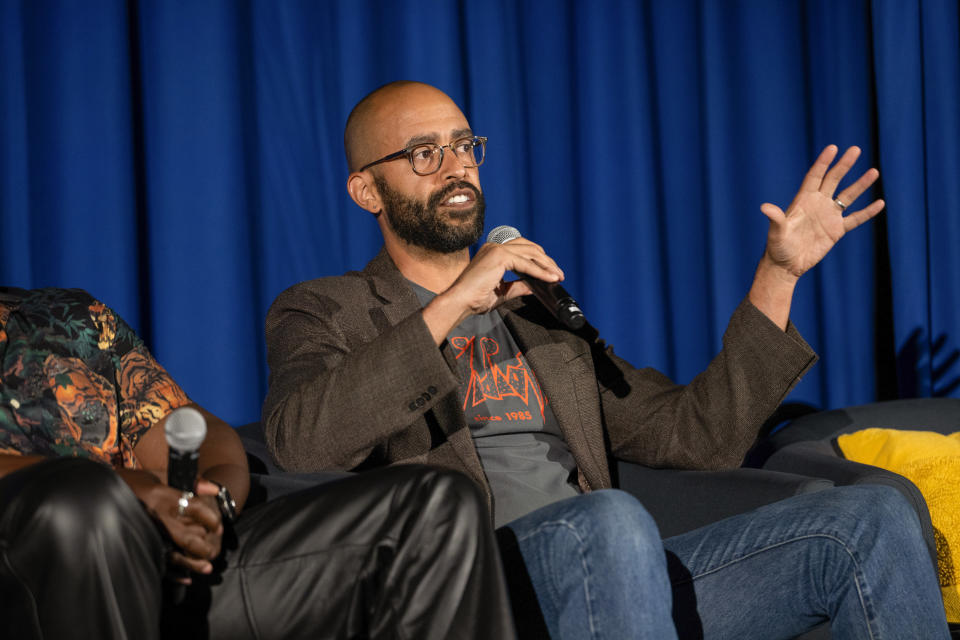
"So my mom had dropped us off at our grandfather's house," he continued. "And he took us to see ET. And I've never been to a theater before. And I remember, I vividly remember that experience, because I was terrified. ET for a 4-year-old is actually pretty scary. The government comes; they take him out of the house. But I wanted to feel that feeling again. And that feeling of being in this place, [in] this enclosed room where the stories that you wouldn't expect were projected in front of you, and were overwhelming, I think it's something that I kind of changed my whole life."
Next, the panelists were asked how "The Wakanda Effect," aka the worldwide popularity and reverence toward this fictional nation and its people, made them feel.
Giphy / Via media.giphy.com
Moore answered this one first. "I mean, for me, it was a bit of a revelation," he began. "And then when you're making a movie, you're focused on making the movie; you're not sure if the movie is going to work. I don't think I understood the hunger for what this movie could mean for people. Really, until Comicon."
Here is #BlackPantherWakandaForever producer #NateMoore talking about the worldwide impact of the first film.
"Because it's honestly not really even about Marvel at that point," he concluded. "It's just about kids. You know, I mean, adults are great. I'm an adult, and I like movies, but like, it's about how fundamentally it was touching kids and showing kids that they could be superheroes because they could finally see themselves."
Wright gave her response next. "It helped me to appreciate and to honor the African diaspora," she explained.
#LetitiaWright explains how the first #BlackPanther helped her to honor different types of African cultures across the diaspora at #D23Expo #BlackPantherWakandaForever
Duke gave the final answer to the "Wakanda Effect" question. "The Wakanda Effect was just seeing these ripples all over, in places that you never expected to see them," he divulged.
Here is #WinstonDuke speaking about inclusion, oppression, and being a Wakandan Ambassador at #D23Expo #WakandaForever
"That was literally the statement right after our movie," he continued. "'It was so special; you guys made something so beautiful. I really want our Black Panther. And I really felt like we got a chance to start saying like...'The time is now for like our movie.' And I said, 'Yeah, because that's the thing about inclusion and freedom because it gives permission.' And the best thing it gives permission for is the permission to dream. That's what I appreciate. That's what oppression stops. Oppression stops the possibility of your dreams. Right? Oppression doesn't allow you to say, 'Hey, man, I can imagine myself in this space.' ... So Black Panther gave people the ability to dream again."
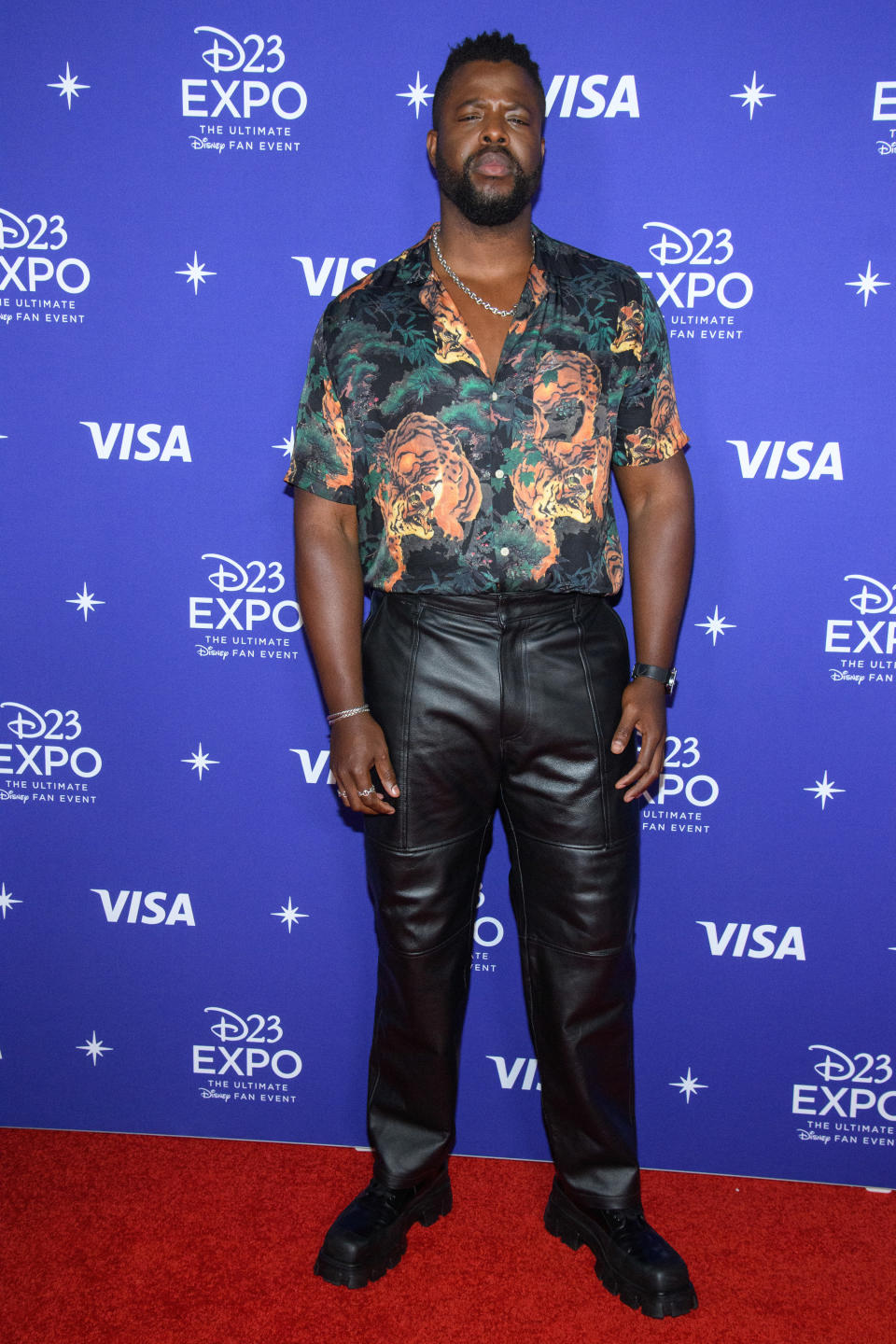
Lastly, the panelists were asked about how Black Panther changed or improved their connection with Africa. Since Wright already touched on that answer, only Duke and Moore answered the final question. One theme that really resonated here was ownership.
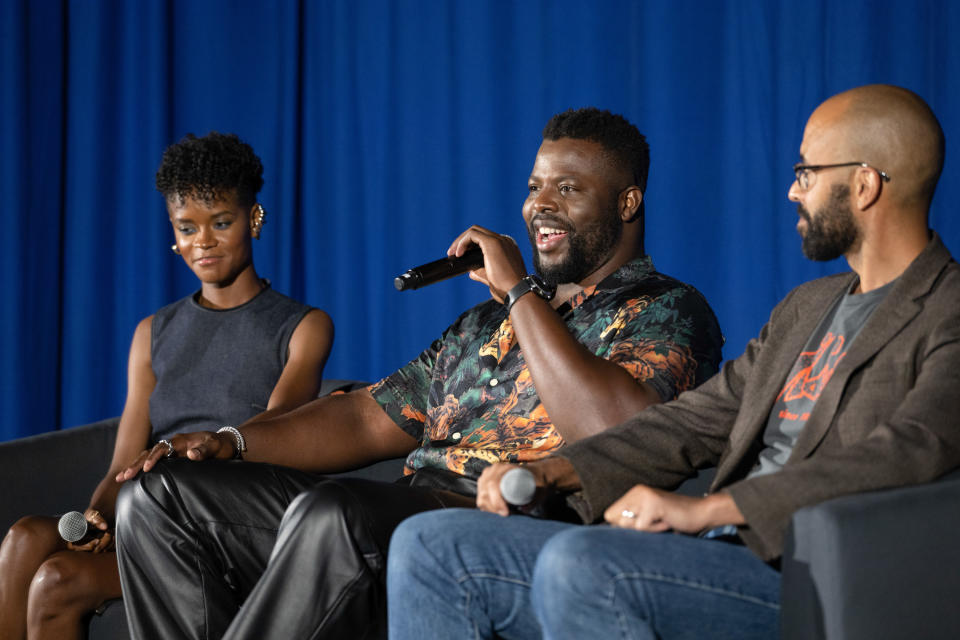
"I saw the kind of amalgamation of Africa, which is what Wakanda was. We, and I, could speak because the other creative participants aren't onstage, but they borrowed things from all over the continent," Duke answered.
More of #WinstonDuke on the influences of #BlackPantherWakandaForever
"We don't get to dress up and have a Harry Potter moment," Duke explained. "There weren't a lot of Black witches in that movie, but you know, we got a chance to dress up. People had a chance to, you know, have our own respectful majestic cosplay. And it was more than pride. It was ownership. I think that's the thing that we're fighting for. And Black Panther took the biggest, boldest step in it. It was ownership."
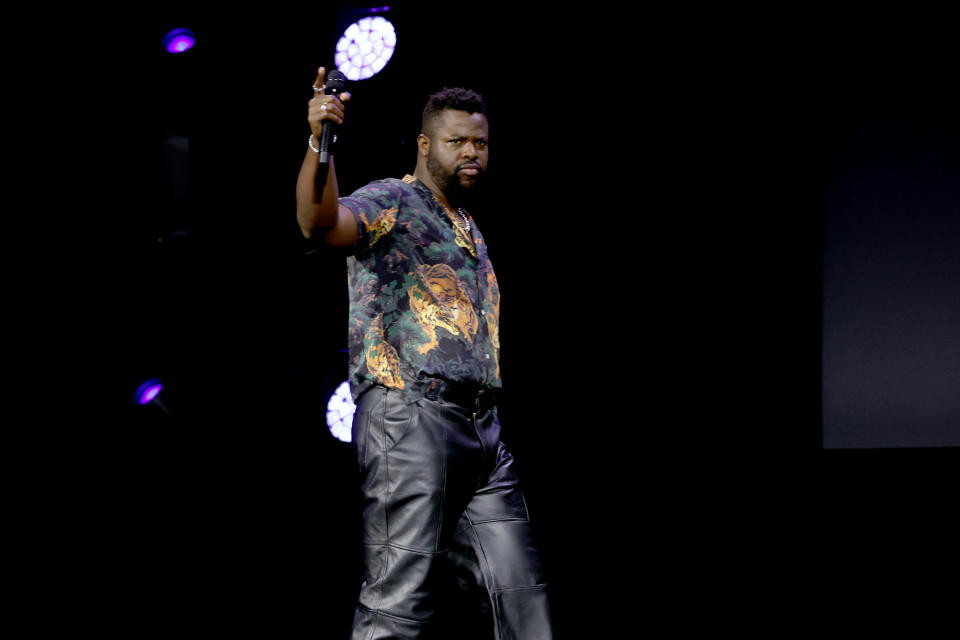
"You know, for a long time, we were just fighting to get a seat at the table. We're fighting to just be included. But now that's what our forefathers fought for. That's what Denzel fought for. You know, Chadwick fought for ownership."
"I do think it's ownership," Moore added. "And it's pride. And it's realizing the breadth of amazing art and architecture and science and all these things out of Africa that we don't celebrate, because they're not celebrated."
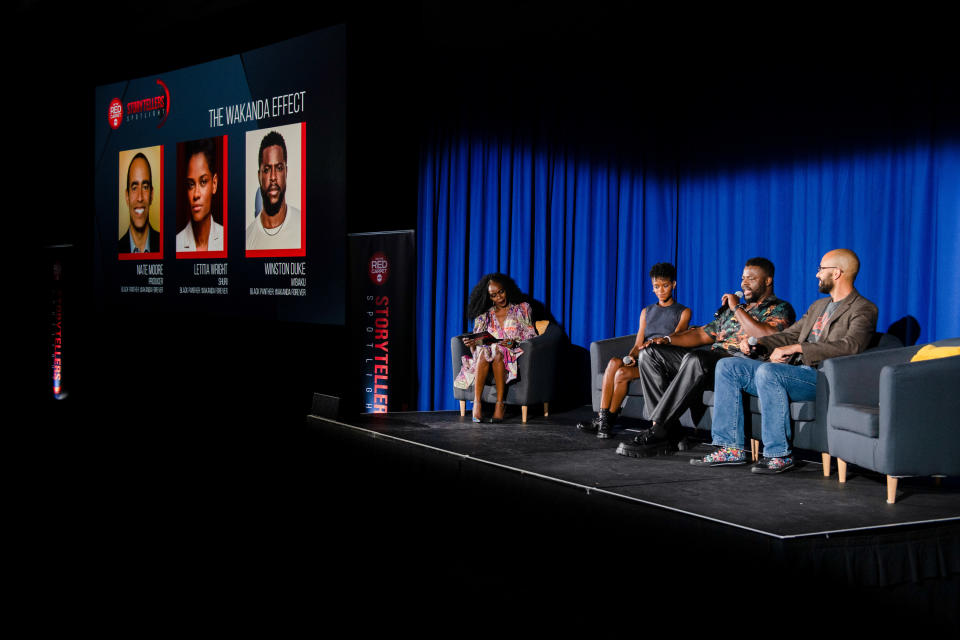
"And when you hear about Africa, a lot of times, especially in American cinema, they are victims; Africans are victims of something that is happening to them, of a culture that is being imposed upon them. And we don't really get to see the culture that they have. The culture that is beautiful, the culture that, as Winston said, is what Wakanda tries to maximize, because it takes pieces of each. But it also, I think, encourages people to go and look for themselves to see the breadth which we borrow it from... Like there's so much amazing culture and life in Africa that Panther scratches the surface of but encourages people, hopefully, to dig deeper and really explore."
Note: Some responses have been edited for length and/or clarity.

 generic
generic 